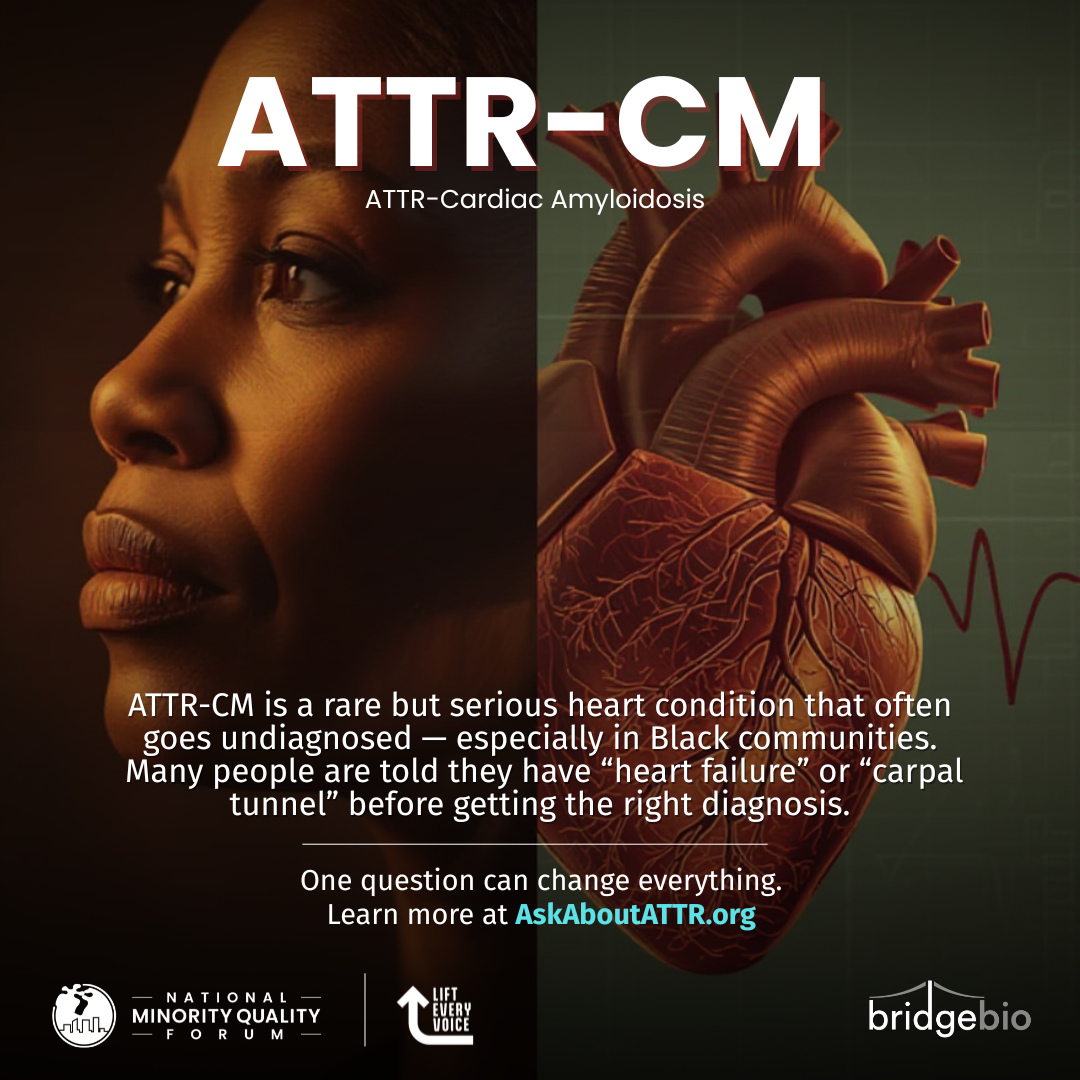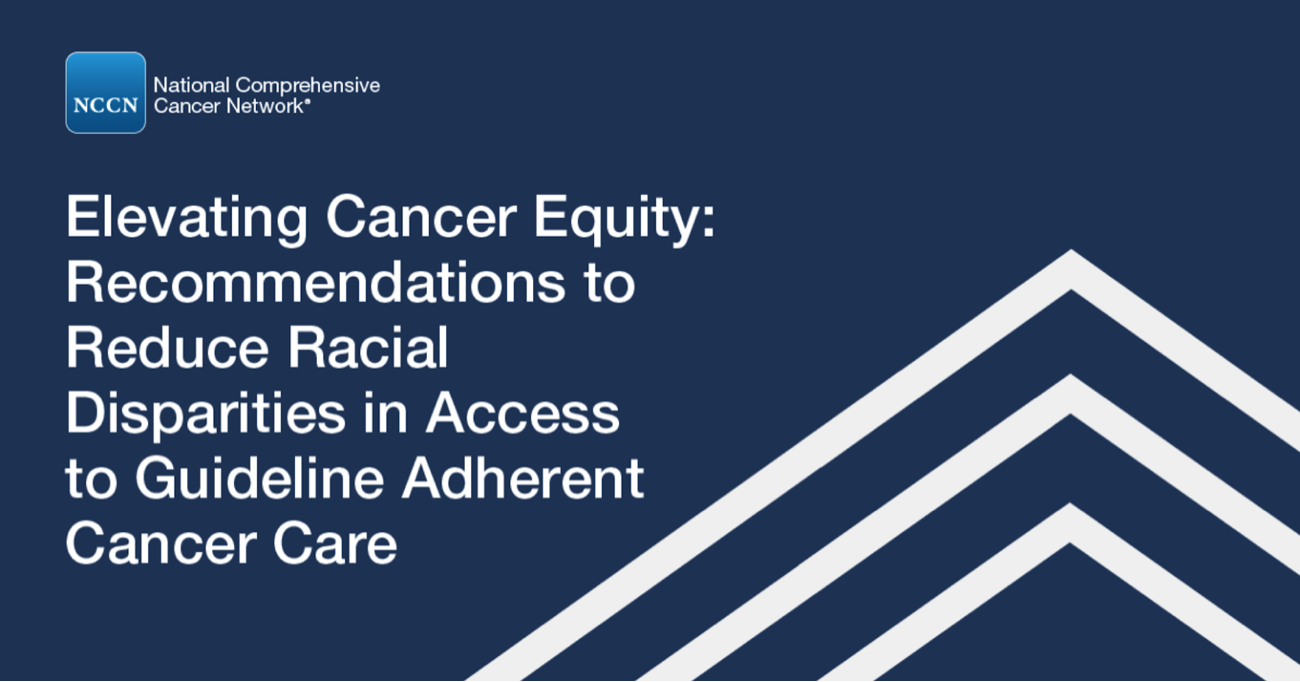
November 13, 2025
By Adjoa Kyerematen
National Minority Quality Forum Launches AskAboutATTR.org to Empower Communities with Knowledge on Rare Heart Condition
Read More

For Immediate Release
23 February 2021 | Washington, DC
Leading Health and Cancer Advocacy Groups Unite to Reduce Racial Disparities in Cancer Care
NCCN, ACS CAN, and NMQF present new polling data showing patient, caregiver and provider views of bias and suggest policy and practice changes to improve equity in access to high quality cancer care.
WASHINGTON, D.C. and PLYMOUTH MEETING, PA — Today, the National Comprehensive Cancer Network® (NCCN®), American Cancer Society Cancer Action Network (ACS CAN) and the National Minority Quality Forum (NMQF) presented new ideas for overcoming inequality in oncology. The recommendations—developed by a group of 17 national experts, representing patients and advocates, caregivers, healthcare providers, researchers, and industry—directly address how medical systems in the United States often disproportionately fail minority patients, particularly those who are Black and/or Indigenous, and draws on extensive polling data from a recent poll fielded by Public Opinion Strategies on behalf of the organizations to make clear the case for urgent action.
Among the notable survey findings: 63% of African American and 67% of Latinx patients, survivors, and caregivers said they had a negative experience with their oncology care team, such as having assumptions made about them or their financial situation, or trouble getting questions answered; in contrast to 43% of white respondents who reported such experiences. As for oncologists, 2/3 of those surveyed believed that non-white patients experienced worse outcomes from cancer care but only 1/3 felt those patient populations were receiving worse care or poorer communication during care.
“The research shows disparities in outcomes that aren’t based on biology; they result from systemic inequality and bias in access and care delivery,” said Robert W. Carlson, MD, Chief Executive Officer, NCCN. “Racism exists in the United States and impacts everyone, including the medical community. One proven method for improving equity is using guideline-concordant care. We’re grateful to be able to learn from experts about what we can do right now to make sure everyone is getting the best evidence-based care possible; the process has been both humbling and inspiring. Now we’re committed to working together to make these recommendations a reality.”
“Communities of color and other medically underserved groups continue to have higher cancer rates and are less likely to be diagnosed early or receive optimal treatment compared to other groups,” said Lisa Lacasse, President of ACS CAN. “Ensuring quality clinical practices are in place and applied equitably to all patients regardless of race, ethnicity, socioeconomic status or geographic location is essential to reducing those disparities. We cannot achieve our mission of a world without cancer until we lessen the burden of this disease across all communities; these recommendations provide important means to achieve that goal.”
“We can improve cancer outcomes for communities of color and rural areas by closing gaps in screening, diagnosis, treatment and survivorship, both in clinical practice and in policy,” said Gary A. Puckrein, PhD, NMQF President and CEO. “NMQF is pleased to collaborate with NCCN and ACS CAN to develop evidence-based recommendations using real-world data that allow us to design a system that delivers high-quality cancer care to all of America’s diverse populations.”
To address the inequalities in access to cancer care, the three organizations convened the Elevating Cancer Equity Working Group, co-chaired by Shonta Chambers, MSW, EVP Health Equity Initiatives and Community Engagement, Patient Advocate Foundation, and Robert Winn, MD, Director, VCU Massey Cancer Center. Workgroup recommendations include a new Equity Report Card to help providers, payers, and accreditation entities advance equitable care delivery. The report card includes 17 measurable practice changes, such as having health systems provide and require annual implicit bias training for all employees, offer culturally and linguistically representative patient navigators or community health workers through internal hiring or contracting with community-based organizations, and offer flexible hours for screening and treatment appointments. The full list of practice recommendations are broken down into the following categories:
Community Engagement
Accessibility of Care and Social Determinants of Health
Addressing Bias in Care Delivery
Quality and Comprehensiveness of Care
The recommendations will be explained in greater detail during a keynote address at the NCCN Virtual 2021 Annual Conference online on March 19.
The organizations also created a series of policy change recommendations targeted toward:
The United States Congress
CMS and Commercial Payers
Federal Agencies
State and Local Policymakers
Policy examples include measures to remove barriers to clinical trial participation and requiring the Food and Drug Administration to consider clinical trial diversity as part of a drug approval process, providing resources to historically black colleges and universities and other minority serving institutions with the goal of fostering a more diverse health care workforce, funding public awareness campaigns around cancer prevention that are linguistically and culturally reflective of diverse audiences, and ensuring access to and reimbursement for patient navigators to assist patients with all kinds of insurance.
The groups plan a series of ongoing engagements for providers, patients and lawmakers as a means to advance this work and improve patient care. A deeper analysis of the Public Opinion Strategies data— which was captured in two surveys, one geared toward patients, survivors, and family caregivers with an oversampling to assure minority representation, and another of oncologists— will be addressed in a future, peer-reviewed article.
To learn more about the working group and next steps, visit NCCN.org/policy. Join the conversation online with the hashtag #ElevatingCancerEquity.
About ACS CAN
The American Cancer Society Cancer Action Network (ACS CAN) is making cancer a top priority for public officials and candidates at the federal, state and local levels. ACS CAN empowers advocates across the country to make their voices heard and influence evidence-based public policy change as well as legislative and regulatory solutions that will reduce the cancer burden. As the American Cancer Society’s nonprofit, nonpartisan advocacy affiliate, ACS CAN is critical to the fight for a world without cancer. For more information, visit www.fightcancer.org.
About the National Comprehensive Cancer Network
The National Comprehensive Cancer Network® (NCCN®) is a not-for-profit alliance of leading cancer centers devoted to patient care, research, and education. NCCN is dedicated to improving and facilitating quality, effective, efficient, and accessible cancer care so patients can live better lives. Visit NCCN.org for more information on the NCCN Clinical Practice Guidelines in Oncology (NCCN Guidelines®) and other initiatives. Follow NCCN on Facebook @NCCNorg, Instagram @NCCNorg and Twitter @NCCN.
About the National Minority Quality Forum
The National Minority Quality Forum assists health care providers, professionals, administrators, researchers, policymakers, and community and faith-based organizations in delivering appropriate health care to minority communities. This assistance is based on providing the evidence in the form of science, research, and analysis that will lead to the effective organization and management of system resources to improve the quality and safety of health care for the entire population of the U.S., including minorities. For more information, please visit www.nmqf.org.
Media Contacts:
ACS CAN: Allison Miller, allison.miller@cancer.org, 202-585-3241
NCCN: Rachel Darwin, darwin@nccn.org, 267-622-6624
NMQF: Kelly Ann Collins, media@nmqf-pr.org, 202-413-1187